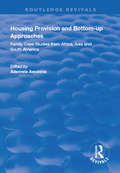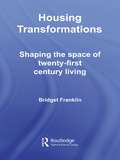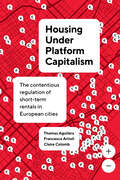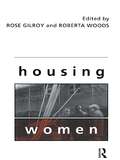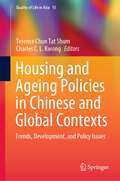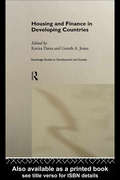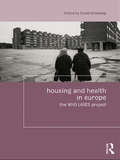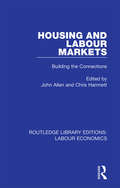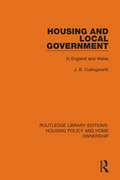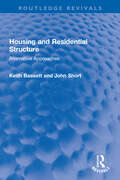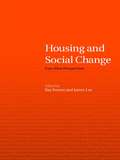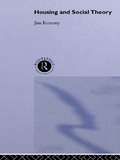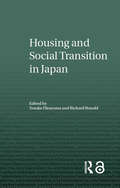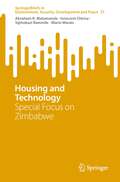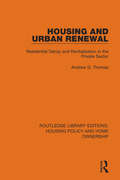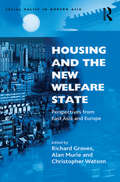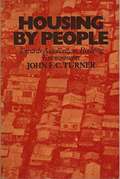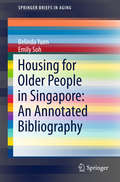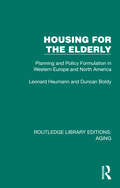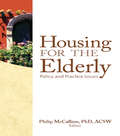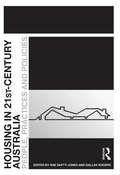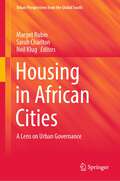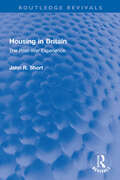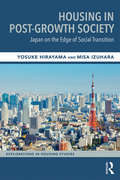- Table View
- List View
Housing Provision and Bottom-up Approaches: Family Case Studies from Africa, Asia and South America (Routledge Revivals)
by Adenrele AwotonaFirst published in 1999, this book consists of in-depth family case studies from Africa, Asia and South America. The purpose of the book is to give a clear understanding of the physical and non-physical structures in bottom-up housing approaches. Physical structures include design aspects, materials, infrastructure and construction methods and stages. Non-physical structures include finance sources, participation and decision processes. All these elements present a challenging task for academics, research, policy makers and non-governmental organizations when intervening in bottom-up housing approaches. The book consists of four sections. Section I is an overview of conceptual issues and cross-national studies. Section II through IV are composed of case studies and fieldwork experiences from Africa, Asia (including the Middle East) and South America.
Housing Transformations: Shaping the Space of Twenty-First Century Living (Housing and Society Series)
by Bridget FranklinDrawing together a wide range of literature, this original book combines social theory with elements from the built environment disciplines to provide insight into how and why we build places and dwell in spaces that are at once contradictory, confining, liberating and illuminating. This groundbreaking book deals with topical issues, which are helpfully divided into two parts. The first presents a conceptual framework examining how the built environment derives from a variety of influences: structural, institutional, textual, and action-orientated. Using illustrated case study examples, the second part covers new build schemes, including urban villages, gated communities, foyers, retirement homes and televillages, as well as refurbishment projects, such as mental hospitals and tower blocks. Multidisciplinary in its focus, Housing Transformations will appeal to academics, students and professionals in the fields of housing, planning, architecture and urban design, as well as to social scientists with an interest in housing.
Housing Under Platform Capitalism: The Contentious Regulation of Short-Term Rentals in European Cities (IJURR Studies in Urban and Social Change)
by Claire Colomb Thomas Aguilera Francesca ArtioliSince the birth of Airbnb in 2008, many of the world's cities have been transformed by platform-mediated short-term accommodation—a phenomenon suspected of disturbing local life and removing dwellings from local housing inventories. Drawing on mixed-method, multi-level comparative research in twelve large European cities, coauthors Thomas Aguilera, Francesca Artioli, and Claire Colomb show that strikingly different regulatory regimes have emerged around short-term rentals. In some cities, policies aim to curb this practice; in others, regulations are simply meant to support the market. These responses are motivated by a variety of political choices and pressures, from grassroots movements to property interests, the tourism industry, and municipal welfare and housing systems. This book makes a crucial contribution to comparative urban politics in the twenty-first century, investigating the capacity of local states to govern housing markets and platform capitalism in an era of globalized human and capital flows. In the face of this worldwide shift, Housing Under Platform Capitalism insists that institutions and regulations can champion the public good by protecting the right to housing and ultimately limiting corporate power.
Housing Women
by Rose Gilroy Roberta WoodsFirst Published in 2004. Routledge is an imprint of Taylor & Francis, an informa company.
Housing and Ageing Policies in Chinese and Global Contexts: Trends, Development, and Policy Issues (Quality of Life in Asia #15)
by Terence Chun Tat Shum Charles C. L. KwongMotivated by the rapid increase in housing demand and the population of older adults worldwide, this book provides an interdisciplinary and multi-level approach for studying housing and ageing issues and relevant policy analysis in China, and beyond. Specifically, it highlights how the changing social, economic, and political factors at both local and global levels affect the housing or ageing experiences of people. Drawing on findings and theoretical discussions in economics, history, psychology, sociology, social policy, and urban studies, the authors offer interdisciplinary perspectives on a highly topical debate, asking what progress is being made on the formulation and implementation of housing and ageing policies in different societies. The book brings together original qualitative and quantitative research works in European, Asia-Pacific and Chinese contexts. Readers will benefit from the results of a rigorous analysis of data and case studies that reveal factors affecting housing or ageing experiences of people in these regions. The interdisciplinary research also provides valuable insights on further policy analyses and formulation in both local and global contexts. It is of interest to scholars, policy makers and university students in the fields of housing, ageing, and social and public policy.
Housing and Finance in Developing Countries (Routledge Studies in Development and Society #Vol. 7)
by Gareth Jones Kavita DattaThis book explores the linkages between formal and informal housing finance drawing upon the lessons of NGO and micro-finance practices. Both public and private formal finance institutions have experienced great difficulty in lending below a middle-income client group, and are often reluctant to lend for the purpose of housing at all. This failure of formal finance to filter down to low-income households, and in particular to women, has led various NGOs and community groups to create and adopt innovative finance programmes, such as informal savings banks and credit rotating schemes. The authors critically assess the impact of theses schemes, and evaluate links between gender, housing and finance.
Housing and Health in Europe: The WHO LARES project (Housing and Society Series)
by David OrmandyIn this cross-disciplinary research David Ormandy and expert contributors explain the nature and development of the World Health Organization's study of housing across Europe. In-depth analysis provides new evidence of links between the health of inhabitants and their housing conditions, with focus on critical topics such as: indoor air pollution the effect of cold homes and dampness noise effects domestic accidents. With practical examples of survey tools, the attention given to methodological approaches makes this text an important resource for policy professionals as well as housing, planning and public health academics.
Housing and Labour Markets: Building the Connections (Routledge Library Editions: Labour Economics #1)
by John Allen Chris HamnettFirst published in 1991. The connection between housing and work is one of the most discussed yet least understood aspects of modern society. Housing and Labour Markets explores the different ways in which housing and labour are linked and examines their central significance in many of the key changes in society today. It provides a wide-ranging analysis of the relationships between housing and labour markets, with accounts of the different forms of work, paid and unpaid, in which various types of households are engaged. This edited collection addresses the varied impact of restructuring in both housing and labour markets in different localities and regions, including contributions from the USA and Australia. By making an important input into the growing debate over the inks between home and work, this book shows the direction in which the debate should go, draws out the principal lines of connection and suggests a way forward. The issues addressed in Housing and Labour Markets will be of interest to a wide range of social science disciplines, especially urban studies, economics, sociology, geography and planning. Local government officers in housing and planning will also find it makes an invaluable contribution to developing links between housing and the workplace.
Housing and Local Government: In England and Wales
by J. B. CullingworthOriginally published in 1966 and written at a time when UK housing policy was undergoing major changes, this volume provides a substantial historical introduction which outlines the development of housing policy in the UK from the mid 19th – mid 20th Centuries. Discussion of the administrative framework, the powers of local housing authorities, housing standards, finance and the improvement of older housing follows. Other issues covered include the social aspects of housing and the role of the state and the objectives of state action.
Housing and Residential Structure: Alternative Approaches (Routledge Revivals)
by John Short Keith BassettFirst published in 1980, Housing and Residential Structure was written to take stock of the many changes that had recently taken place in explanatory approaches to housing markets and residential structure. The book is divided into three parts. Part One focuses on the demand-orientated approaches of human ecology and neo-classical economics. Part Two discusses the institutional approaches with reference to an analysis of private and public sector housing in Britain, drawing on illustrative material from North America and France to aid the comparative analysis of institutional structures. Part Three is devoted to an evaluation of the Marxist approaches to housing and residential structure from Marx and Engels to Castells and Harvey.
Housing and Social Change in Europe and the USA: Michael Ball, Michael Harloe, And Maartje Martens
by Michael Harloe Ball Michael Maartjie MartensFirst published in 1988. This book argues that there is a growing structural crisis in the provision of housing in advanced capitalist countries and that the steady improvement in housing conditions since 1945 is unlikely to continue. The dilemmas facing housing policy makers can no longer be seen as concerned just with distributional questions but with problems generated by the restructuring of key elements of housing provision, including private housing finance and the housebuilding industry. It looks at housing markets, housing policies and specific institutions connected with housing provision in many advanced capitalist countries, including Britain, the USA, France, West Germany, the Netherlands and Denmark. It considers the different sectors and the changes taking place there, using case study material where appropriate to support its varied and convincing arguments.
Housing and Social Change: East-West Perspectives (Housing and Society Series)
by James Lee Ray ForrestThis wide-ranging exploration of the key contemporary relationships between social change and housing is both policy-oriented and theoretical, drawing on a group of internationally-respected academics. It is also multidisciplinary, incorporating sociology, economics, social policy and human geography perspective. Its international perspective is rooted in its examination of issues such as economic insecurity and instability, social diversity, financial and social exclusion, sustainability, privatisation and state legitimacy, the interaction of the global and the local across three continents.
Housing and Social Theory
by Jim KemenyStudies in housing have often concentrated on an abstract institutionalised approach isolated from the broader base of the social sciences. This book is the first to treat housing as a subject of social theory. It provides a critique of current research and theorises housing in relation to political science, social change and welfare developing a case study to illustrate these applications. By being sometimes controversial, this book will stimulate debate among housing theorists and sociologists alike. The Author is currently Senior Research fellow at the Swedish Institute for Building Research and Docent in Sociology at Uppsala University. He has written widely on Housing, Urban Studies and Sociology and his books include THE MYTH OF HOME OWNERSHIP and THE GREAT AUSTRALIAN NIGHTMARE.
Housing and Social Transition in Japan (Housing and Society Series)
by Richard Ronald Yosuke HirayamaBringing together a number of perspectives on the Japanese housing system, Housing and Social Transition in Japan provides a comprehensive, challenging and theoretically developed account of the dynamic role of the housing system during a period of unprecedented social and economic change in one of the most enigmatic social, political, and economic systems of the modern world. While Japan demonstrates many of the characteristics of some western housing and social systems, including mass homeownership and consumption-based lifestyles, extensive economic growth and rapid urban modernization has been achieved in balance with traditional social values and the maintenance of the family system. Helpfully divided into three sections, Housing and Social Transition in Japan: explores the dynamics of the development of the housing system in post-war Japan deals with social issues related to housing in terms of social aging, family relations, gender and inequality addresses the Japanese housing system and social change in relation to comparative and theoretical frameworks. As well as providing challenges and insights for the academic community at large, this book also provides a good introduction to the study of Japan and its housing, economic, social and welfare system generally.
Housing and Technology: Special Focus on Zimbabwe (SpringerBriefs in Environment, Security, Development and Peace #37)
by Innocent Chirisa Abraham R. Matamanda Siphokazi Rammile Mario MaraisThe housing and human settlement sector is fast changing, and technology is making it more complex than ever before. With reference to Zimbabwe, a developing country in Southern Africa, the essence of this book is to bring out housing as an issue within the technology debate and practice. The following themes emerge from the 6 chapters in the book: • The characterisation and conceptualisation of housing and technology and the nexus of both • The complexity of housing challenges and the problems governments face in providing adequate housing, especially for the poor • Diverse practices in housing construction through the application of different typologies of technology • Assessment of the feasibility of technologies in housing development in Zimbabwe by mirroring them against global experiences. • Discussion of alternative policy approaches that may guide technology integration in housing development. This book will excite scholars and practitioners in urban and development studies, construction project management, urban sociology, geography, real estate together with policymakers and government officials.
Housing and Urban Renewal: Residential Decay and Revitalization in the Private Sector
by Andrew D. ThomasOriginally published in 1986, this book provides an authoritative summary of late 20th Century trends which affected housing stock and a comprehensive commentary on policies which were designed to improve housing stock. The policies referred to are specific to England and Wales but the experience is relevant to other countries facing similar trends: a growth in owner-occupation, increasing problems of disrepair and low levels of investment in the housing stock. It will be on interest to those concerned with levels of investment in older urban areas, with the impact of subsidies on housing tenure, and with the role of government in controlling housing quality.
Housing and the New Welfare State: Perspectives from East Asia and Europe
by Richard GrovesThe changing nature and significance of housing provision within welfare states is considered in this timely book. With housing playing an increasingly important role in welfare provision, the new welfare state emerging in different parts of the world is being developed in the context of individual asset accumulation and the private ownership of housing. Housing and the New Welfare State shows that housing is becoming critical to asset-based welfare not only in Western Europe but also in the six East Asian housing systems that are a major focus of the book. Chapters by leading East Asian scholars provide analysis of housing policies in Singapore, Hong Kong, Korea, Japan, China and Taiwan. Also examined are the 'four worlds' of welfare and housing; the causes and consequences of the shift from tenants to home owners in the old welfare states of Britain and other parts of Western Europe; and the growth of the property-owning welfare state as a theme running through contemporary policy in both East Asia and Europe.
Housing by People: Toward Autonomy In Building Environments
by John F.C. TurnerA unique and timely contribution to housing theory and practice that presents alternative ideas for what has become one of the most pressing of contemporary problems.
Housing for Older People in Singapore: An Annotated Bibliography
by Belinda Yuen Emily SohThis bibliography offers valuable annotated references on housing for older population for those interested in these initiatives and discussions. It begins with an overview piece on the state of policy, practice and research on housing for the older population in Singapore. This is followed by an annotated bibliography featuring published and unpublished work, spanning recent decades, pertaining to housing for the older population with emphasis on Singapore. It encompasses theoretical and empirical research reported in journal articles and book chapters as well as grey literature, like dissertations and theses, conference proceedings, working papers and newspaper articles. The bibliography also contains additional citations covering global studies, in particular, in Asia, North America and UK. It is hoped that this bibliographic material will serve as a useful starting reference point for discussions on housing of older people in Singapore and also for key developments in other parts of the world. The goal is to encourage additional scholarship.
Housing for the Elderly: Planning and Policy Formulation in Western Europe and North America (Routledge Library Editions: Aging)
by Leonard Heumann Duncan BoldyDuring the 1970s housing and social welfare policy as it affected the elderly was changing throughout Western society. Conventional high-rise apartments and institutionalized nursing or residential homes were no longer the sole public responses to housing the elderly. In place of these two extremes on the housing continuum was a variety of intermediate supportive systems that aided independent living. Assisted Independent Living (AIL) programmes were designed to keep the elderly in as independent a living environment as possible despite increasing functioning disabilities and frailties that often accompany advancing age.
Housing for the Elderly: Policy and Practice Issues
by Philip McCallionFind out how housing options for the elderly are changing—and not always for the betterTo maintain or improve their quality of life, many seniors in the United States will move to new locations and into new types of housing. Housing for the Elderly addresses the key aspects of the transitions they’ll face, examines how housing programs can help, and looks at the role social workers can play to ensure they remain healthy, happy, and productive as they age. Housing for the Elderly provides the tools to build a comprehensive understanding of how housing is changing to support the growing number of elderly persons in the United States. This unique resource examines a full range of housing options, including assisted-living communities, elder friendly communities, and homelessness; looks at the effects of the Olmstead Decision of 1999, which requires states to place persons with disabilities in community settings rather than in institutions; and summarizes current research on Naturally Occurring Retirement Communities (NORCs). The book also presents a historical perspective of housing issues for the elderly, with a special focus on the discrimination of African-Americans. Topics in Housing for the Elderly include: creating elder friendly communities homelessness among the elderly in Toronto housing disparities for older Puerto Ricans in the United States grandparent caregiver housing programs how the Olmstead Decision affects the elderly, social workers, and health care providers New York State’s experience with NORCs relocation concerns of people living in NORCs the integration of services for the elderly into housing settings-particularly low-income housing moving from a nursing home to an assisted-living facility assisted-living and Medicaid and much more!Housing for the Elderly is an essential resource for social work practitioners, administrators, researchers, and academics who deal with the elderly.
Housing in 21st-Century Australia: People, Practices and Policies
by Rae Dufty-Jones Dallas RogersOver the last two decades new and significant demographic, economic, social and environmental changes and challenges have shaped the production and consumption of housing in Australia and the policy settings that attempt to guide these processes. These changes and challenges, as outlined in this book, are many and varied. While these issues are new they raise timeless questions around affordability, access, density, quantity, type and location of housing needed in Australian towns and cities. The studies presented in this text also provide a unique insight into a range of housing production, consumption and policy issues that, while based in Australia, have implications that go beyond this national context. For instance how do suburban-based societies adjust to the realities of aging populations, anthropogenic climate change and the significant implications such change has for housing? How has policy been translated and assembled in specific national contexts? Similarly, what are the significantly different policy settings the production and consumption of housing in a post-Global Financial Crisis period require? Framed in this way this book accounts for and responds to some of the key housing issues of the 21st century.
Housing in African Cities: A Lens on Urban Governance (GeoJournal Library)
by Sarah Charlton Margot Rubin Neil KlugThis edited collection from across the African continent offers a diverse set of analytical accounts that engage with the urban governance dynamics, drivers and impacts of a wide variety of housing initiatives. These include insights into the relationships between parties and actors undertaking developments, or whose housing activities impact on the city. The book illustrates issues of power distribution, the visions or agendas motivating these actions, and the instruments used to advance them. It considers the rise of mega housing projects; private sector driven residential developments; unobtrusive transformations of existing building stock, establishment and upgrading of informal settlements; and state driven low cost housing schemes. It surfaces the contestation, collaborations and conflicts as well as the power relations that operate within cities and which are made visible on cityscapes. Housing and human settlement scholars as well as those interested in urban politics and governance dynamics in the global south and across the African continent will find much to appreciate in this volume.
Housing in Britain: The Post-War Experience (Routledge Revivals)
by John R. ShortFirst published in 1982 at a time when housing policy featured prominently in the press and in political debate, Housing in Britain was written to provide an authoritative review of housing in Britain. The book is a comprehensive introduction to the major policy shifts from 1945 to the year of publication. It explores the many aspects of ‘housing’ as a matter of state policy; as a commodity with a certain market for its sale and exchange; as an essential item, with rules regulating access and eligibility; and as a vital element in the reproduction of social life. Particular attention is paid to the institutions involved within the British housing market, and the redistributional consequences of housing-market processes and state housing policy. Housing in Britain will appeal to those with an interest in the history of British housing policy and debates, and the history of social policy in Britain.
Housing in Post-Growth Society: Japan on the Edge of Social Transition (Explorations in Housing Studies)
by Misa Izuhara Yosuke HirayamaIn a globalising world, many mature economies share post-growth characteristics such as low economic growth, low fertility, declining and ageing of the population and increasing social stratification. Japan stands at the forefront of such social change in the East Asian region as well as in the Global North. It is in this context of ‘post-growth society’ that housing issues are examined, using the experiences of Japan at the leading edge of social transition in the region. The post-war housing system was developed during the golden age of economy and welfare, when upward social trajectories such as increasing population, high-speed economic growth with rising real incomes, housing construction driven by high demands, increasing rates of home ownership supported by generous government subsidies generated new housing opportunities and accompanying issues. As we have entered the post-growth phase of socio-economic development, however, it requires a re-examination of such structure, policy and debates. This volume explores what roles housing plays in the reorganisation and reconstruction of economic processes, social policy development, ideology and identity, and intergenerational relations. The volume offers a greater understanding of the characteristics of post-growth society – changing demography, economy and society – in relation to housing. It considers how a definitive shift to the post-growth period has produced new housing issues including risks as well as opportunities. Through analysis of the impact on five different areas: post-crisis economy, urban and regional variations, young adults and housing pathways, fertility and housing, and ageing and housing wealth, the authors use policy and institutions as overarching analytical tools to examine the contemporary housing issues in a post-growth context. It also considers any relevance from the Japanese experiences in the wider regional and global context. This original book will be of great interest to academics and students as well as policy makers and practitioners internationally in the fields of housing studies, urban studies, social policy, sociology, political economy, comparative analysis, and East Asian Studies.
